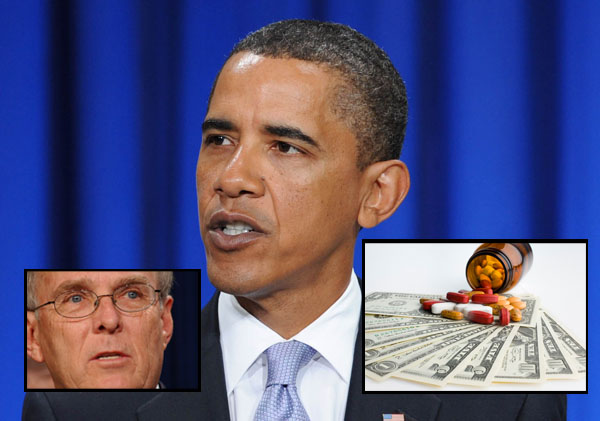After the Food and Drug Administration fired off a letter that helped kill a measure fiercely opposed by the drug industry, one Democratic senator is accusing the Obama White House of using the FDA — which is supposed to offer apolitical opinions — as a bludgeon.
The drug importation amendment to the health reform bill, which would have saved the government and consumers billions of dollars by allowing prescription purchases from Canada and elsewhere, was killed in the Senate late Tuesday with an assist from the FDA letter. The 51-48 vote fell short of the 60 votes needed.
The letter from FDA Commissioner Margaret Hamburg that raised the specter of “significant safety concerns” not fully addressed in the amendment was seized on by opponents of the measure. “This is a matter of life or death,”
pleaded Sen. Frank Lautenberg (D-NJ). (We’ve posted the letter here.)
Long opposed by industry — but championed by President Obama during the 2008 campaign — drug importation is an idea that the Obama Administration still supports in concept, according to the FDA letter. But Hamburg wrote the bipartisan Senate amendment, sponsored by Byron Dorgan (D-ND), didn’t solve “safety issues” and presented a “logistically challenging” structure.
But in an interview with the Wall Street Journal this week, Dorgan said his amendment would set up a totally safe system, and accused the White House of initiating or influencing the FDA letter. Here’s how Dorgan says it went down — and how the FDA responded in an interview with us:
Hearing rumors of an FDA letter opposing his amendment last week, Dorgan called Hamburg to inquire about that matter. She told him that she didn’t know of any letter. Then, just 24 hours later, on Dec. 8, the letter went out, signed by Hamburg, to two senators opposing the amendment.
This string of events, Dorgan asserts, shows “the letter was prompted, probably drafted somewhere else [like] the White House.”
Asked about Dorgan’s timeline by TPMmuckraker, FDA spokesperson Meghan Scott did not say it was inaccurate. “The Commissioner did speak to Sen. Dorgan in the days before the letter was sent,” Scott says. “On that call, she expressed the FDA’s concerns, but at the time, no decision had been made on whether or not to send a letter.”
Scott adds that the letter was sent in response to an inquiry by Sens. Sam Brownback (R-KS) and Tom Carper (D-DE). And she argues that the letter is consistent with the FDA’s past position on drug importation.
We asked Scott what seems to be the key question: what, if any, role did the White House have in all of this? She responded: “Letters like these are generally reviewed by the Administration before being sent to the Hill.” That seems to confirm that the White House at least knew about the letter being sent, but there’s still no evidence that the administration prompted the letter or influenced its contents.
At the same time, neither the FDA nor the White House has denied Dorgan’s charges. The White House declined to comment in detail on the allegations today. But a White House official told TPMDC’s Christina Bellantoni that “whenever there is a communication with the Hill on legislation, it is coordinated and reviewed by OMB. That is the standard process.” OMB is the Office of Management and Budget.
All of this is occurring against a backdrop of President Obama’s controversial “deal” with the pharmaceutical industry in June, under which the industry pledged $80 billion in discounts for consumers in exchange for protection against tougher measures targeting drug companies. The industry group Pharmaceutical Researchers and Manufacturers Association pledged to back Obama’s overhaul.
A key part of that deal was reportedly for the administration to kill any drug import measure like Dorgan’s.









